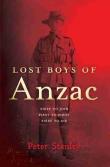AustLit
Latest Issues
AbstractHistoryArchive Description
'Australians remember the dead of 25 April 1915 on Anzac Day every year. But do we know the name of a single soldier who died that day? What do we really know about the men supposedly most cherished in the national memory of war?
'Peter Stanley goes looking for the Lost Boys of Anzac: the men of the very first wave to land at dawn on 25 April 1915 and who died on that day. There were exactly 101 of them. They were the first to volunteer, the first to go into action, and the first of the 60,000 Australians killed in that conflict.
'Lost Boys of Anzac traces who these men were, where they came from and why they came to volunteer for the AIF in 1914. It follows what happened to them in uniform and, using sources overlooked for nearly a century, uncovers where and how they died, on the ridges and gullies of Gallipoli – where most of them remain to this day. And we see how the Lost Boys were remembered by those who knew and loved them, and how they have since faded from memory. ' (Publication summary)
Publication Details of Only Known VersionEarliest 2 Known Versions of
Other Formats
- Also e-book.
Works about this Work
-
Recordkeeping in the First Australian Imperial Force : The Political Imperative
2020
single work
criticism
— Appears in: Archives and Manuscripts , vol. 48 no. 2 2020; (p. 123-141)'Recordkeeping systems develop under the influence of their environment. An organisation’s compilation of records, their form, content and dissemination can be in response to external factors. How the recordkeeping administration of the First Australian Imperial Force (AIF) developed, expanded and changed over time is illustrative of the influences on the creation of records. The administration of the First Australian Imperial Force, including its recordkeeping, developed in an environment of heated political debate in Australia over that nation’s participation in the war and two failed attempts to introduce conscription. Circumstances in late 1915 combined to force a reluctant Australian government to intervene in the detail of AIF records administration in Egypt despite the government’s expectation that involvement at such a level in AIF management abroad would be unnecessary. This article examines the circumstances at work in Australia that led to such an intervention. It describes the events leading to the decision and traces the causes for the decision to factors in the political, social and military context.' (Publication abstract)
-
[Review Essay] LOST Boys of Anzac
2017
single work
essay
— Appears in: Journal of Australian Studies , March vol. 41 no. 1 2017; (p. 133-135) -
Removing Death's Cloak of Invisibility
2014
single work
review
— Appears in: The Age , 3 May 2014; (p. 32)
— Review of Lost Boys of Anzac 2014 single work biography -
Who Were These Brave 101 Who Died First at Gallipoli?
2014
single work
review
— Appears in: The Sun-Herald , 27 April 2014; (p. 13)
— Review of Lost Boys of Anzac 2014 single work biography -
Mystery Man Died in First Charge
Tracing the Mystery Man of Gallipoli Who Died in First Charge
2014
single work
column
— Appears in: The Sun-Herald , 20 April 2014; (p. 16) The Canberra Times , 20 April 2014; (p. 10)
-
Who Were These Brave 101 Who Died First at Gallipoli?
2014
single work
review
— Appears in: The Sun-Herald , 27 April 2014; (p. 13)
— Review of Lost Boys of Anzac 2014 single work biography -
Removing Death's Cloak of Invisibility
2014
single work
review
— Appears in: The Age , 3 May 2014; (p. 32)
— Review of Lost Boys of Anzac 2014 single work biography -
Mystery Man Died in First Charge
Tracing the Mystery Man of Gallipoli Who Died in First Charge
2014
single work
column
— Appears in: The Sun-Herald , 20 April 2014; (p. 16) The Canberra Times , 20 April 2014; (p. 10) -
[Review Essay] LOST Boys of Anzac
2017
single work
essay
— Appears in: Journal of Australian Studies , March vol. 41 no. 1 2017; (p. 133-135) -
Recordkeeping in the First Australian Imperial Force : The Political Imperative
2020
single work
criticism
— Appears in: Archives and Manuscripts , vol. 48 no. 2 2020; (p. 123-141)'Recordkeeping systems develop under the influence of their environment. An organisation’s compilation of records, their form, content and dissemination can be in response to external factors. How the recordkeeping administration of the First Australian Imperial Force (AIF) developed, expanded and changed over time is illustrative of the influences on the creation of records. The administration of the First Australian Imperial Force, including its recordkeeping, developed in an environment of heated political debate in Australia over that nation’s participation in the war and two failed attempts to introduce conscription. Circumstances in late 1915 combined to force a reluctant Australian government to intervene in the detail of AIF records administration in Egypt despite the government’s expectation that involvement at such a level in AIF management abroad would be unnecessary. This article examines the circumstances at work in Australia that led to such an intervention. It describes the events leading to the decision and traces the causes for the decision to factors in the political, social and military context.' (Publication abstract)




